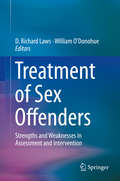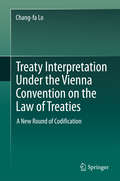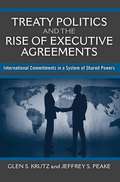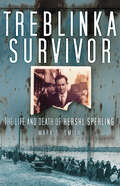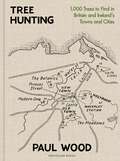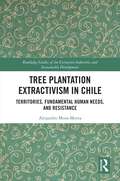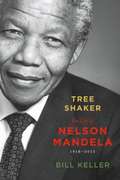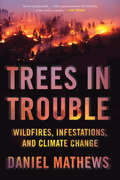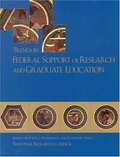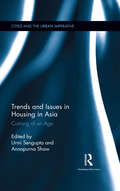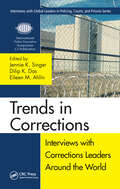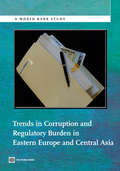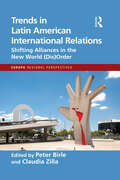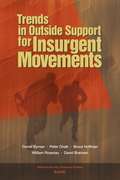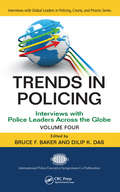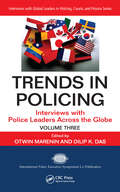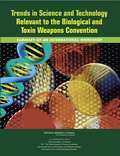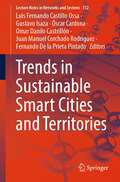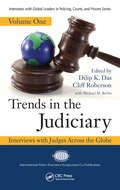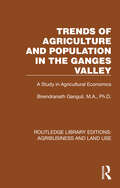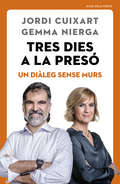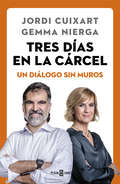- Table View
- List View
Treatment of Sex Offenders
by D. Richard Laws William O'DonohueThis rigorous survey offers a comprehensive rethinking of the assessment and treatment of sexual offenders for a bold challenge to practitioners. It critiques what we understand about offenders and the mechanisms of offending behaviors, and examines how this knowledge can best be used to reduce offending and relapses. To this end, experts weigh the efficacy of common assessment methods and interventions, the value of prevention programs, and the validity of the DSM's classifications of paraphilias. This strengths/weaknesses approach gives professional readers a guide to the current state as well as the future of research, practice, and policy affecting this complex and controversial field. Included in the coverage: Strengths of actuarial risk assessment. Risk formulation: the new frontier in risk assessment and management. Dynamic risk factors and offender rehabilitation: a comparison of the Good Lives Model and the Risk-Need-Responsivity Model. The best intentions: flaws in sexually violent predator laws. Desistance from crime: toward an integrated conceptualization for intervention. From a victim/offender duality to a public health perspective. A call to clear thought and accurate action, Treatment of Sex Offenders will generate discussion and interest among forensic psychologists, psychiatrists, clinical psychologists, and social workers.
Treaty Interpretation Under the Vienna Convention on the Law of Treaties: A New Round of Codification
by Chang-Fa LoThis book is devoted to an idea of a second round of codification of certain new rules for treaty interpretation. Currently, treaty interpretation is guided by Articles 31 through 33 of the Vienna Convention on the Law of Treaties (VCLT). The fundamental rule is that a treaty shall be interpreted in good faith in accordance with the ordinary meaning to be given to the terms of the treaty in their context and in the light of its object and purpose. These rules lay the foundation for treaty interpretation. They represent the first round of codification of the contents of some previous customary international law rules. The book argues that the current rules are overly simplified. After almost fifty years of codification of the VCLT, the codified text in it is practically insufficient in addressing some traditional treaty interpretation issues (such as the interpretation involving time factors or technology development) and in coping with some new development of international law (such as the diversification and fragmentation of international treaties) and new challenges (such as the need of coordination between different treaties and the need of introducing external values, including human rights, into a treaty through treaty interpretation process). The book further argues that there is a need to have a second round of codification so as to incorporate new rules into the VCLT to be followed by treaty interpreters to make treaty interpretation more consistent and transparent, and more in line with the shared value of international community. The book proposes the contents of certain new rules to be considered as the new codified rules for treaty interpretation.
Treaty Politics and the Rise of Executive Agreements
by Jeffrey S. Peake Glen S. Krutz"From readingTreaty Politics and the Rise of Executive Agreements, I learned a good deal about a topic that I thought I knew well. This book will be an excellent addition to the literature on the presidency; it will be read and cited by scholars working in this field. " ---Benjamin Ginsberg, Johns Hopkins University The expansion of executive power has been referred to pejoratively as the rise of the "imperial presidency. " In foreign relations, presidents have exercised a growing independence through the use of executive agreements. The U. S. Constitution specifies that two-thirds of the Senate must ratify a proposed treaty and makes no provision for other forms of international agreements. In 1942, however, the Supreme Court affirmed the legality of executive agreements; and since WWII, they have outnumbered treaties by more than ten to one. Are presidents trampling the Constitution or seeking to streamline the diplomatic process? Glen S. Krutz and Jeffrey S. Peake argue that the preference for executive agreements is the result of a symbiotic evolution of the executive and the legislative branches. In order for the United States to survive in a complex, ever-changing global environment and maintain its world power status, it must complete international commitments swiftly and confidently. Members of Congress concur that executive agreements allow each branch to function more effectively. At the same time, the House continues to oversee particular policy areas; and presidents still submit the majority of the most significant international commitments to the Senate as treaties. Rather than an assault on the balance of power, Krutz and Peake conclude, executive agreements represent a mutual adaptation of the executive and the legislature in a system of shared power. Glen S. Krutz is Associate Director of the Carl Albert Center and Associate Professor of Political Science at the University of Oklahoma. Jeffrey S. Peake is Associate Professor of Political Science at Bowling Green State University.
Treblinka Survivor: The Life and Death of Hershl Sperling
by Mark S SmithMore than 800,000 people entered Treblinka, and fewer than seventy came out. Hershl Sperling was one of them. He escaped. Why then, fifty years later, did he jump to his death from a bridge in Scotland? The answer lies in a long-forgotten, published account of the Treblinka death camp, written by Hershl Sperling himself in the months after liberation and discovered in his briefcase after his suicide. It is reproduced here for the first time. In Treblinka Survivor, Mark S. Smith traces the life of a man who survived five concentration camps, and what he had to do to achieve this. Hershl's story, which takes the reader through his childhood in a small Polish town to the bridge in faraway Scotland, is testament to the lasting torment of those very few who survived the Nazis' most efficient and gruesome death factory. The author personally follows in his subject's footsteps from Klobuck, to Treblinka, to Glasgow.
Tree Hunting: 1,000 Trees to Find in Britain and Ireland’s Towns and Cities
by Paul WoodDiscover the ultimate urban tree-spotter’s guideThe Rebel Tree. The Climber’s Lime. The Ecclesiastical Pear.In Tree Hunting, Paul Wood seeks out the best individual trees – the most charismatic, quirky or downright spectacular – that grow in Britain and Ireland's towns, cities and villages (and, in one case, from the crack in a church steeple). From a stumpy sycamore in Shetland, contorted by wind and hard weather, to the shining jewel in Brighton’s unlikely treasure trove of elms, Paul travels on a quest from north to south rooting out the legends and tall tales behind these marvellous specimens. As he delves into this rich ecosystem, he reveals how trees are inextricably bound to the story of our towns and cities: they have always meant a great deal to those that live near them, and they continue to shape the fabric of urban life in deep, and often surprising ways.Including sumptuous maps, grid references and charming travel notes so you can plan adventures of your own, Tree Hunting will help you unlock the secrets of Britain and Ireland's urban forests.
Tree Plantation Extractivism in Chile: Territories, Fundamental Human Needs, and Resistance (Routledge Studies of the Extractive Industries and Sustainable Development)
by Alejandro Mora-MottaThis book examines how extractivism transforms territories and affects the well-being of rural people, drawing on in-depth fieldwork conducted on tree plantations in Chile.The book argues that pine and eucalyptus monoculture plantations in southern Chile are a form of extractivism representing a mode of nature appropriation that captures large amounts of natural resources to produce wooden-based raw materials with little processing and an export-oriented focus. The book discusses the nexus of extractivism, territorial transformations, well-being, and emerging resistances using a participatory action research methodological approach in the Region of Los Ríos, southern Chile. The findings show how the configuration of an extractivist logging enclave generated a substantial and irrevocable reordering of human-nature relations, resulting in the territorial and ontological occupation of rural places that disrupted the fundamental human needs of peasants and indigenous people. The book maintains that Chile's green growth development approach does not challenge the consolidated tree plantation enclave controlled by large multinationals. Instead, green growth legitimises the extractivist logic. The book draws parallels with other countries and regions to contribute to wider debates surrounding these topics.This book will be of great interest to students and scholars of the extractive industries, development studies, political ecology, and natural resource governance.
Tree Shaker: The Story of Nelson Mandela
by Bill KellerHe was a child of royalty, born and raised to defend tradition. But his African name--Rolihlahla, meaning "tree shaker"--hinted at a very different future. Nelson Mandela would spend most of his life shaking his country to its roots. For challenging the cruel system of apartheid, Mandela would be condemned as South Africa's most notorious outlaw and spend more than twenty-seven years in prison. He would emerge to lead a peaceful revolution, becoming the father of a new South Africa and one of the world's most inspiring heroes. The new updated edition of New York Times veteran Bill Keller's moving biography looks back on Mandela's life, offering a clear-eyed view of his legacy and bringing his remarkable story to a new generation of readers.
Trees in Trouble: Wildfires, Infestations, and Climate Change
by Daniel MathewsA troubling story of the devastating and compounding effects of climate change in the Western and Rocky Mountain states, told through in–depth reportage and conversations with ecologists, professional forest managers, park service scientists, burn boss, activists, and more. Climate change manifests in many ways across North America, but few as dramatic as the attacks on our western pine forests. In Trees in Trouble, Daniel Mathews tells the urgent story of this loss, accompanying burn crews and forest ecologists as they study the myriad risk factors and refine techniques for saving this important, limited resource.Mathews transports the reader from the exquisitely aromatic haze of ponderosa and Jeffrey pine groves to the fantastic gnarls and whorls of five–thousand–year–old bristlecone pines, from genetic test nurseries where white pine seedlings are deliberately infected with their mortal enemy to the hottest megafire sites and neighborhoods leveled by fire tornadoes or ember blizzards.Scrupulously researched, Trees in Trouble not only explores the devastating ripple effects of climate change, but also introduces us to the people devoting their lives to saving our forests. Mathews also offers hope: a new approach to managing western pine forests is underway. Trees in Trouble explores how we might succeed in sustaining our forests through the challenging transition to a new environment.
Tremor
by Craig DirgoOver a hundred years ago, Nikola Tesla created a device for transferring electricity without wires. It was supposed to be his greatest triumph. Instead, his invention spawned a nightmare so terrifying that it was hidden from the world...until now. Unusual surges of electricity are being tracked emanating from the former Yugoslavia. Special Agent John Taft of the National Intelligence Agency is dispatched to investigate the phenomenon, and uncovers a conspiracy of terror, led by a fanatical Serbian nationalist and powered by a machine capable of targeting any location on the globe-and causing apocalyptic earthquakes to strike on command. Now, as the terrorists fell cities at will with their earth-shattering weapon, Taft must fight a battle on dangerous ground, against an unstable foe whose greatest desire is to control the world--or destroy it.
Trends In Federal Support Of Research And Graduate Education
by Committee on Trends in Federal Spending on Scientific Engineering ResearchThe Board on Science, Technology and Economic Policy updated its 1999 analysis (Appendix A, Securing America's Industrial Strength, 1999) of changes since 1990 in the distribution of federal research funding by field of science and engineering) by incorporating FY 1998 and FY 1999 obligations from the NSF Federal Funds survey, with particular attention to the trends in basic research support, changes in research fields' relative dependence on research-sponsoring agencies, and the relationship between changes in research support and changes in enrollment in graduate training in selected fields of research. The Board did not recommend funding levels for any discipline but addressed procedural aspects of R&D budgeting.
Trends and Issues in Housing in Asia: Coming of an Age (Cities and the Urban Imperative)
by Annapurna Shaw Urmi SenguptaThis book offers a comprehensive overview of current housing practices across Asian cities based on facts and trends in the market. For many countries in Asia, the future of housing is now. This future is closely linked to successful theoretical advancement and policy practice in housing studies. This volume brings together twelve chapters divided across four thematic parts that sum up the concept and conditionality of housing in Asian cities. It studies housing through conceptual perspectives and empirical studies to explore established notions, cultures and practices relevant to the 21st-century post-reform context in Asia. Housing and property have long been economic drivers, leading many individual households towards better lives and associated social and community benefits, while also collectively improving the economic base of a city or country. This book examines the nature of the interplay of both state and market in the housing outcomes of these cities. With its extensive geographic coverage across South East Asia, South Asia, and the Far East and a cross section of different income groups, the book will interest reseachers and scholars in urban studies, architecture, development studies, public policy, political studies, sociology, policymakers in local and central governments, housing and planning professionals and commercial firms engaged in property markets or real estate in Asia. It will also provide ideas, tools and good practices for institutional enablement, stakeholders involved in these interventions, private sector organisations and NGOs.
Trends in Corrections: Interviews with Corrections Leaders Around the World, Volume One (Interviews with Global Leaders in Policing, Courts, and Prisons)
by Dilip K. Das Eileen M. Ahlin Jennie K. SingerOffering rare insiders perspectives, Trends in Corrections: Interviews with Corrections Leaders Around the World is a comprehensive survey of correctional programming and management styles used across nations. Twelve chapters present transcribed interviews of corrections leaders along with a brief portrait of the corrections system in those jurisd
Trends in Corruption and Regulatory Burden in Eastern Europe and Central Asia
by World Bank StaffHistorically countries of Eastern Europe and Central Asia have faced a number of obstacles in their transition to democracy and market-based economies. These obstacles include higher levels of corruption, and greater administrative and regulatory burdens as they pass laws and implement programs to combat corruption and promote private sector development. This report uses the results of the most recent Business Environment and Enterprise Performance Survey (BEEPS) to examine trends in corruption and administrative burden of regulations on private sector firms in 29 Eastern European and Central Asian countries. The results show overall positive trends in the Eastern Europe and Central Asian region in terms of incidence of corruption and the burden placed on private sector firms by administrative and other regulations. . The most notable and definitive finding from the 2008 BEEPS is a continuation in the favorable trend regarding firms' payment of administrative bribes. Across the region, there has been progress made in the perceptions of bribery and unofficial payments. Frequency of bribe-paying fell significantly in the areas of taxes, customs and imports and courts, for the region overall and in most countries. The report examines several factors that influence the level of administrative corruption, including regulatory burden, strength of anti-corruption legislation, and income (among others). Results show that countries with greater capacity to enforce and implement anti-corruption measures are less likely to have high levels of corruption and incidence of graft. The results presented in the report show that countries of Eastern Europe and Central Asia are no longer facing higher corruption or regulatory burden than firms in comparable non-transition countries.
Trends in Latin American International Relations: Shifting Alliances in the New World (Dis)Order (Europa Regional Perspectives)
by Peter BirleSince the beginning of US President Donald Trump’s second term, the already volatile international order has faced increasingly disruptive developments and fundamental challenges. This volume outlines and analyses the role of Latin America as a whole, and of individual countries including Argentina, Brazil, Chile, Colombia and Mexico, in the new global (dis)order.The book is divided into three parts. The first contains contributions on regional dynamics in Latin America: What do global developments mean for Latin America’s development options? What are the consequences for Latin American regionalism? Why have regional democracy clauses repeatedly proved ineffective? The second part examines the role of external actors in Latin America: the USA, China, the European Union and Russia. The third section analyses the foreign policies of single states and asks what role concepts such as ‘active non-alliance’ and ‘feminist foreign policy’ play for Latin America. In their concluding remarks, the editors analyse the potential consequences of Trump’s policies for the topics covered in the volume after the first 100 days of his Administration.The volume provides an up-to-date, theory-based examination of key issues in Latin American international relations and is essential reading for scholars, students, policymakers and others interested in Latin American international relations.
Trends in Outside Support for Insurgent Movements
by Bruce Hoffman Peter Chalk Daniel Byman William Rosenau David BrannanThe most useful forms of outside support for an insurgent movement include safe havens, financial support, political backing, and direct military assistance. Because states are able to provide all of these types of assistance, their support has had a profound impact on the effectiveness of many rebel movements since the end of the Cold War. However, state support is no longer the only, or indeed necessarily the most important, game in town. Diasporas have played a particularly important role in sustaining several strong insurgencies. More rarely, refugees, guerrilla groups, or other types of non-state supporters play a significant role in creating or sustaining an insurgency, offering fighters, training, or other forms of assistance. This report assesses post-Cold War trends in external support for insurgent movements. It describes the frequency that states, diasporas, refugees, and other non-state actors back guerrilla movements. It also assesses the motivations of these actors and which types of support matter most. This book concludes by assessing the implications for analysts of insurgent movements.
Trends in Policing: Interviews with Police Leaders Across the Globe, Volume Four (Interviews with Global Leaders in Policing, Courts, and Prisons)
by Dilip K. Das Bruce F. BakerTrends in Policing: Interviews with Police Leaders Across the Globe, Volume Four, is the latest installment in a series of insightful interviews with senior police executives worldwide. The book offers readers an unparalleled insider‘s perspective on police goals, practices, and management in nationwide, regional, and city environments. Conducted b
Trends in Policing: Interviews with Police Leaders Across the Globe, Volume Three (Interviews with Global Leaders in Policing, Courts, and Prisons)
by Dilip K. Das Otwin MareninSeveral years ago, the Trends in Policing series unveiled insiders accounts of how police leaders perceive the work they do. These volumes feature interviews with practitioners who speak candidly about their concerns and opinions. They present their evaluations of programs and philosophies that worked and those that did not, describe their concept
Trends in Science and Technology Relevant to the Biological and Toxin Weapons Convention: Summary of an International Workshop
by National Research Council of the National AcademiesThis report offers a summary of the substantive presentations during an international workshop, Trends in Science and Technology Relevant to the Biological and Toxin Weapons Convention, held 31 October - 3 November, 2010 at the Institute of Biophysics of the Chinese Academy of Sciences. It is meant to provide scientists and other technical experts with factual information about the range and variety of topics discussed at the workshop, which may be of interest to national governments and non-governmental organizations as they begin to prepare for the 7th Review Conference of the Biological and Toxin Weapons Convention (BWC) in 2011. The Beijing workshop reflected the continuing engagement by national academies international scientific organizations, and individual scientists and engineers in considering the biosecurity implications of developments in the life sciences and assessing trends in science and technology (S&T) relevant to nonproliferation. The workshop provided an opportunity for the scientific community to discuss the implications of relevant developments in S&T for multiple aspects of the BWC. Trends in Science and Technology Relevant to the Biological and Toxin Weapons Convention follows the structure of the plenary sessions at the workshop. It begins with introductory material about the BWC and current examples of the types and modes of science advice available to the BWC and other international nonproliferation and disarmament agreements, in particular the Chemical Weapons Convention (CWC). This report includes only a very brief description of the some of the post-presentation discussions held during the plenary sessions - and does not include an account of the small breakout groups - since these were intended to inform the committee's finding and conclusions and will be reflected in the final report.
Trends in Sustainable Smart Cities and Territories (Lecture Notes in Networks and Systems #732)
by Juan Manuel Corchado Rodriguez Gustavo Isaza Luis Fernando Castillo Ossa Óscar Cardona Omar Danilo Castrillón Fernando De la Prieta PintadoThis book presents the latest scientific and technical advances in the fields of Smart Cities and Smart Territories. It shows outcomes of 2nd Sustainable Smart Cities and Territories International Conference in Manizales (Colombia) on June 21–23, 2023. The concept of smart cities, which emerged in the early 2000s, attempts to solve these challenges by implementing information and communication technologies. The initial concept of smart cities focused on the modernization of megacities.
Trends in the Draw of Americans to Foreign Terrorist Organizations from 9/11 to Today
by Eric Robinson Nathan Chandler Heather J. WilliamsThe Islamic State of Iraq and the Levant (ISIL) has recently been more successful than al Qaeda in gaining U.S. terrorist recruits. The authors undertake a demographic profile of individuals drawn to foreign terrorist organizations and find that the affiliates average terrorists recruited by ISIL is younger, less educated, and more likely to be African American/black or Caucasian/white and a U.S.-born citizen.
Trends in the Early Careers of Life Scientists
by National Research CouncilIn each year between 1994 and 1996, more than 7,000 individuals received a Ph.D. in life-science, and the number of graduates is rising sharply. If present trends continue, about half of those graduates will have found permanent positions as independent researchers within ten years after graduation. These statistics--and the labor market situation they reflect--can be viewed either positively or negatively depending on whether one is a young scientist seeking a career or an established investigator whose productivity depends on the labor provided by an abundant number of graduate students.This book examines the data concerning the production of doctorates in life-science and the changes in the kinds of positions graduates have obtained. It discusses the impact of those changes and suggests ways to deal with the challenges of supply versus demand for life-science Ph.D. graduates. Trends in the Early Careers of Life Scientists will serve as an information resource for young scientists deciding on career paths and as a basis for discussion by educators and policymakers as they examine the current system of education linked to research and decide if changes in that system are needed.
Trends in the Judiciary: Interviews with Judges Across the Globe, Volume One (Interviews with Global Leaders in Policing, Courts, and Prisons)
by Cliff Roberson Dilip K. Das Michael M. BerlinU.S. Supreme Court justices are studied publicly, but scant attention is generally paid to the judges who function daily in other courts of the world. Trends in the Judiciary: Interviews with Judges Across the Globe assembles a collection of interviews conducted by international scholars and researchers. It provides an insider‘s perspective of how
Trends of Agriculture in the Ganges Valley: A Study in Agricultural Economics (Routledge Library Editions: Agribusiness and Land Use #11)
by Birendranath GanguliOriginally published in 1938, this book explores the problem of the adjustment of the population in the early 20th century to the agricultural-economic environment in a geographical and economic setting. The study of the modern problem of population growth is also one of human adjustment in its wider sense to the whole of the environment, which in itself is an ensemble of various interdependent factors. The study is based on a classification of agricultural regions in the Ganges Valley which shows some of the world’s highest records of agricultural productivity.
Tres dies a la presó: Un diàleg sense murs
by Jordi Cuixart Gemma Nierga«He trobat la meva llibertat a la presó.» Un diàleg intens de Jordi Cuixart i Gemma Nierga que permet comprendre una figura clau del present polític. «El procés afecta emocionalment tots els catalans, tant si pengem banderes del balcó com si ens prenen per equidistants, i els periodistes hem d'intentar prendre distància i explicar què està passant ara i aquí», afirma Gemma Nierga. Amb aquesta ferma voluntat, ha pogut conversar tres dies amb en Jordi Cuixart en un locutori de la presó de Lledoners. I en un diàleg obert, amb franquesa i contundència, el president d'Òmnium es mostra en la seva dimensió més humana i també en la més política. El llibre és fruit d'aquestes sessions que van tenir lloc en un entorn hostil com el del centre penitenciari, i amb un vidre que força a saludar-se com es fa entre reixes -posant les mans a la mateixa altura, palmell contra palmell- i reflecteix l'excepcionalitat del moment que estem vivint. Amb emoció sincera en alguns moments, amb rigor i sense renúncies a expressar les opinions personals, el diàleg aborda la trajectòria personal de Jordi Cuixart -els seus orígens familiars i la seva experiència professional-, la vida a les presons de Soto del Real i de Lledoners -la convivència amb els altres presos i moments durs com la vaga de fam d'alguns d'ells- i la política, des del paper d'Òmnium en la societat catalana fins a la manifestació davant de la conselleria d'Economia per la que està sent jutjat acusat de rebel·lió. Amb extraordinària transparència, Jordi Cuixart mostra el seu tarannà i la seva visió de futur. «He trobat la meva llibertat a la presó. En una situació adversa, m'he trobat a mi mateix. Soc més lliure dins de la presó que la gent que és fora. Ho soc en parlar de política, ho soc perquè ja no puc patir pels altres», escriu. I conclou: «Des d'un punt de vista polític, penso en el futur de Catalunya. I hem de tenir clar que la situació que estem vivint, malauradament, va per llarg.» I per a tots els lectors -«la persona que he conegut és diferent de la persona que esperava conèixer», afirma Gemma Nierga-, el llibre ofereix un retrat sorprenent i trasbalsador d'una experiència humana i política extraordinàries. «No espero l'indult, perquè Espanya no està preparada per donar-lo. I si arriba, serà una mala notícia per a ells perquè voldrà dir que es gira full i no es resol el conflicte. I aquest problema s'ha de solucionar ara, no el podem traspassar a les properes generacions. Ja l'hem anat arrossegant durant molts anys. Havien dit que moltes coses no es podien fer, però les hem fet: votar l'1 d'Octubre, per exemple. Qui diu que no podem fer un referèndum vinculant al segle XXI?» Jordi Cuixart
Tres días en la cárcel: Un diálogo sin muros
by Jordi Cuixart Gemma Nierga«He encontrado mi libertad en la cárcel.» Un diálogo intenso entre Jordi Cuixart y Gemma Nierga que permite comprender una figura clave en el actual momento político. «El procés afecta emocionalmente a todos los catalanes, tanto si colgamos banderas en el balcón como si nos toman por equidistantes, y los periodistas debemos intentar tomar distancia y explicar qué está ocurriendo aquí y ahora», afirma Gemma Nierga. Con esta firme voluntad, ha podido conversar tres días con Jordi Cuixart en un locutorio de la cárcel de Lledoners. Y en un dialogo abierto, con franqueza y contundencia, el presidente de Òmnium muestra su dimensión humana y también la política. El libro es fruto de estas sesiones que han tenido lugar en un entorno hostil como el de la cárcel y con un cristal que obliga a saludarse como se hace entre rejas -poniendo las manos a la misma altura, palma contra palma- y reflejan la excepcionalidad del momento que vivimos. Con sincera emoción en algunos momentos y sin renunciar a expresar las opiniones personales, la entrevista aborda la trayectoria personal de Jordi Cuixart -sus orígenes familiares y su experiencia profesional-, la vida en las cárceles de Soto del Real y de Lledoners -la convivencia con los otros presos y momentos duros como la huelga de hambre de algunos de ellos- y la política, desde el papel de Òmnium en la Sociedad catalana a la manifestación frente a la Conselleria d'Economia por la que se le juzga acusado de rebelión. Con extraordinaria transparencia, Jordi Cuixart muestra su personalidad y su visión de futuro. «He encontrado mi libertad en la cárcel. Soy más libre dentro de la cárcel que la gente que está fuera. Lo soy cuando hablo de política, lo soy porque no sufro por los demás», afirma. Y concluye: «Desde un punto de vista político, pienso en la situación del futuro de Cataluña. Y debemos tener claro que la situación que estamos viviendo, lamentablemente, va para largo». Y para todos los lectores -«la persona que he conocido es diferente de la persona que esperaba conocer», afirma Gemma Nierga-, el libro ofrece un retrato sorprendente y el relato alarmante de una experiencia humana y política extraordinarias. «No espero el indulto porque pienso que España no está preparada para darlo. Y si llega el indulto, será una mala noticia para España porque querrá decir que se pasa página y no se resuelve el conflicto. Y este problema debemos solucionarlo ahora, no lo podemos traspasar a las próximas generaciones. Ya lo hemos ido arrastrando de una generación a otra durante muchos años. Habían dicho que muchas cosas no se podían hacer, pero las hemos hecho: votar el 1 de Octubre, por ejemplo. ¿Quién dice que no podemos hacer un referéndum vinculante en el siglo XXI?» Jordi Cuixart
